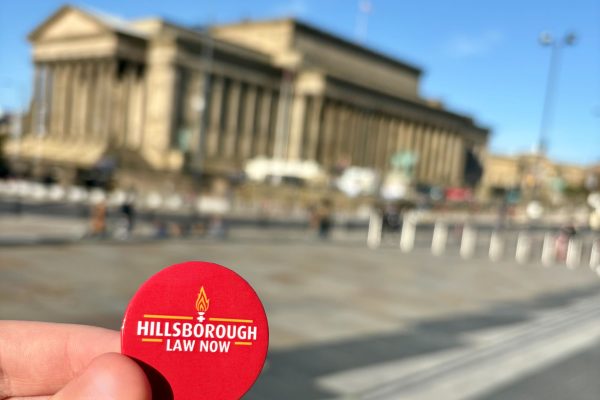6th November 2023
Listen
Listen

You may have heard about The Hillsborough Law, or to give it its proper name, ‘The Public Office (Accountability) Bill’. It has the capacity to change the culture and relationship between the public and public authorities within the UK dramatically. Here is why you should know about it.
The bill calls for ‘candour, transparency and frankness’ from public officials and employees of public offices and institutions. It aims to provide a deterrence against lying and deceitfulness towards the public. This includes misleading information and withholding of potentially useful information. Evidently, there are many obstacles the bill faces before it is enacted into the law by the government.
It continues to face opposition from Parliamentarians, the civil service, and those whose intentions the bill does not serve. Now on its way through Parliament, the bill is vulnerable to being watered down so that its power to hold public authorities and officials to account is weakened. This is why it is crucial that you, students and other members of the public, are well-informed on the proceedings. The more support from the public, the more likely the bill will uphold its strength and potential despite its few adversaries.
This article provides an overview of the bill’s origins, its features, and its ability to change lives in the UK:
Firstly, the passage of the bill through the UK Parliament is underway, being discussed and amended right now. Secondly, it aims to change the culture of the UK, and therefore, your day-to-day life and interactions with public bodies. Thirdly, the Centre for People’s Justice here at University of Liverpool is conducting a project research initiative on the advancement of public engagement with the making of the law. It is all very close to home, especially considering the legacy of the Hillsborough Disaster and Liverpool FC.
It has been 36 years since the fatal crowd crush at Hillsborough Stadium in 1989. The disaster caused the loss of 97 Liverpool FC fans and is the worst sports disaster the UK has ever seen. Since then, the survivors and bereaved of the 97 have fought for some kind of accountability to be taken, especially after the wealth of lies and blame pinned upon the victims by public authorities. The Hillsborough Law is the legacy project of the victims, calling for measures to deter such atrocities and lies.
Unfortunately, Hillsborough was not the only occasion public authorities have been deceitful, misleading and unhelpful after disasters and during inquiries:
These are a handful of public scandals, disasters and inquiries in which the public have been misled, lied to, and unfairly treated in the search for truth and accountability.
So, we know where the bill has arisen from, and why it is needed. Now we should ask how the Hillsborough Law can change this deeply ingrained culture of state abuse of power against its citizens? What specific features of the new law are being proposed? How can it aid in rebuilding public trust and its relationship with the state? And how quickly could this happen?
The law has been designed to force public authorities to tell the truth through the deterrence of new criminal offences. It would hold household institutions to higher standards of ethical conduct. The British public would have more power and equity when dealing with and against the state.
For example, the heads and employees of public offices would be legally required to uphold a duty of candour and transparency. This includes institutions like the British Government, NHS bodies, the Post Office, the Ministry of Defence, and policing bodies, to name a few. This would aid the course of justice and inquiry through improving the efficiency and speed at which we reach the truth.
Furthermore, equity in legal representation would be provided through legal aid funding; people who have been affected by a disaster or scandal and are seeking answers from public authorities would receive public funding for legal representations as the authorities have previously. Once again, this aims at providing balance and strengthening the position of the public against entities wishing to inhibit the path to the truth.
As you can see, these features of the bill seek to change the culture of state abuse of power within UK life. By enacting legal frameworks, the playing field between public offices and the public can be levelled and therefore an element of trust can be reestablished in the relationship. Furthermore, it has the ability to prevent future disasters like the Grenfell Tower Fire of 2017 through candour and transparency.
The passage process is already underway in the House of Commons: the second reading is sitting this Monday, 3 November 2025. This means voting and adaptations to the bill are still being discussed by the MPs and committees in the House of Commons.
If you’d like to know more about the process of the passing of bills in government, I recommend you visit the UK Parliament website here, where you can view the bill and track its progress through the House of Commons, the House of Lords and the Final Stages. It is thought a form of the Hillsborough Law, once amended, could receive Royal Assent sometime around Spring 2026 – although this is not definitive. The potential date of enactment is subject to all the factors previously noted.
The Centre for People’s Justice are providing informational videos and updates on many social media platforms:
Instagram – @centreforpeoplesjustice
X – @cfpjustice
TikTok – @cfpjustice
BlueSky – @cfpjustice.bsky.social
YouTube – @CentreforPeoplesJustice
LinkedIn – Centre for People’s Justice
Many thanks to the Centre for People’s Justice and Professor Lydia Hayes at the University of Liverpool for an engaging and informational evening on Thursday 23rd October and additional guidance and knowledge.